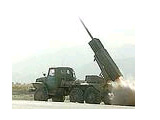|
|
TODAY.AZ / Politics
Israel: Hezbollah used Russian missiles
18 August 2006 [23:49] - TODAY.AZ

Asaf Shariv, a senior adviser to Prime Minister Ehud Olmert, said that the delegation had gone to Russia, but did not elaborate.
The anti-tank missiles proved to be one of Hezbollah's most effective weapons in combat in south Lebanon, killing many of the 118 Israeli soldiers who died in the clashes.
Israeli officials say that Iran and Syria passed the arms to Hezbollah after buying them from Russia.
Russian Foreign Ministry spokesman Mikhail Kamynin said Russia maintains strict controls over its weapons sales that "makes any inaccuracy in weapons destinations impossible."
Anatoly Tsyganok, head of Russia's Military Forecasting Center, ruled out the possibility that modern anti-tank weapons had reached Hezbollah through Russia or Syria.
"Any accusations alleging Russian or Syrian deliveries of anti-tank weapons to any forces in Lebanon are unfounded. The Israeli side has not presented any evidence of this, and it is unlikely that it will," Tsyganok was quoted by the Interfax news agency as saying.
"Most probably, such weapons, should Hezbollah militants really have any, might have been brought to Lebanon through third countries," he added.
/The Associated Press/
URL: http://www.today.az/news/politics/29156.html
 Print version
Print version
Connect with us. Get latest news and updates.
See Also
- 18 April 2025 [18:43]
Nearly 69 hectares cleared of mines in liberated Gazakh territories - 18 April 2025 [18:20]
Horadiz-Aghband railway line nears two-thirds completion - 18 April 2025 [14:41]
Separatists & Pashinyan - the farce continues - 18 April 2025 [14:31]
Khojaly victim testifies at Baku Military Court: “Madat Babayan’s gang tortured me” - 18 April 2025 [13:42]
Iranian President Pezeshkian to visit Azerbaijan with large economic delegation - 18 April 2025 [12:47]
Trial continues for Armenian-origin individuals accused of war crimes in Azerbaijani territories - 18 April 2025 [11:26]
Hikmat Hajiyev: “Azerbaijan restored sovereignty through correct and successful policy” - 18 April 2025 [11:11]
Collapse of "macaronism": Resignation of the "grey cardinal" of France may cause a chain reaction - 18 April 2025 [10:10]
Pashinyan made mistake that Yerevan regret - 17 April 2025 [15:00]
Azerbaijan, Slovenia forge new business ties with preliminary deals
Most Popular
 Separatists & Pashinyan - the farce continues
Separatists & Pashinyan - the farce continues
 4SIM signs MoUs with Chinese institutions to boost cooperation in green and industrial technologies
4SIM signs MoUs with Chinese institutions to boost cooperation in green and industrial technologies
 Collapse of "macaronism": Resignation of the "grey cardinal" of France may cause a chain reaction
Collapse of "macaronism": Resignation of the "grey cardinal" of France may cause a chain reaction
 Paris hosts debut of Azerbaijan’s first AI art “Shusha”
Paris hosts debut of Azerbaijan’s first AI art “Shusha”
 Khojaly victim testifies at Baku Military Court: “Madat Babayan’s gang tortured me”
Khojaly victim testifies at Baku Military Court: “Madat Babayan’s gang tortured me”
 Foreign diplomats tour liberated cities of Khankendi and Shusha
Foreign diplomats tour liberated cities of Khankendi and Shusha
 Pashinyan made mistake that Yerevan regret
Pashinyan made mistake that Yerevan regret
